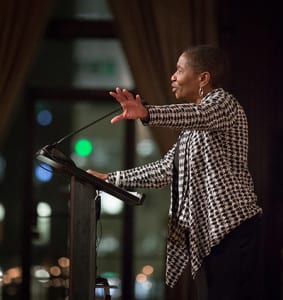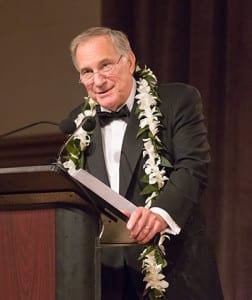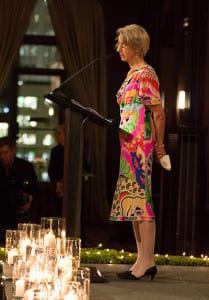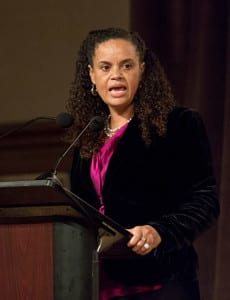By Andrew Cohen
In many circles, using the law for good has become a tired cliché. But at Berkeley Law’s annual Citation Award Dinner on Oct. 20, that ethos stood out as the honorees’ connective thread.
Feted at the Julia Morgan Ballroom in San Francisco, Michele Roberts ’80 and John Phillips ’69 each won a Citation Award—the law school’s highest honor—which recognizes exceptional contributions to the bar, the bench, legal scholarship, and the world. Roberts is the executive director of the National Basketball Players Association, Phillips is the U.S. Ambassador to Italy and San Marino.
Professor Emerita Eleanor Swift received the Faculty Lifetime Achievement Award, which honors the contributions and accomplishments of an exemplary Berkeley Law faculty member. East Bay Community Law Center (EBCLC) Executive Director Tirien Steinbach ’99 received the Young Alumni Award, given to a graduate from the past 15 years who has made significant contributions through professional, charitable, or other public service activities.
University of California President Janet Napolitano delivered opening remarks and hailed the honorees for “showing that you can make a difference in a lot of different ways. For many of us who are lawyers, it’s not enough to master the craft of law or to mold a career in law. It becomes a call to give something back to your communities. And this is the call that Berkeley Law helps instill in its alumni.”
Wanting to help

Last year, Roberts became the first woman to lead a major professional sports union. Before becoming a hugely successful private-practice litigator, she spent about eight years as a public defender in Washington, D.C., where three of her acquitted defendants named children after her. In 2002, Washingtonian magazine called Roberts “the finest pure trial lawyer in Washington—magic with juries, loved by judges, feared by opposing counsel.”
During Roberts’ acceptance speech, she credited her mother—who raised her in a South Bronx housing project and died two months after she passed the bar exam—for paving her professional path. “When she’d ask why I wanted to do this, I told her ‘I just want to help some people in trouble,” Roberts said.
While Roberts has represented Fortune 100 clients and led trial teams for global commercial cases, a juvenile client from early in her career remains the most memorable. “She kept stealing, and I kept getting her out. And one day I told her, ‘Girlfriend, you need to stop stealing.’” After not seeing her for several months, a friend of hers told Roberts “the reason she isn’t stealing anymore is because she’s prostituting.”
After Roberts discovered that the girl, who she dubbed Sheila, was working at a strip club, she went there with another lawyer and got her off the stage. “I spent two years with that girl—whose mother said to me, ‘Why are you wasting your time, she’s garbage,’—getting her in school and out of the streets.”
Four years ago, Roberts got a letter from a young woman. “She wrote, ‘You don’t know me. I just graduated from Spelman College, my mother told me about you, and I just want to say thank you.’ That’s the client I’d tell my mother about. I came to law school to help people, and Berkeley taught me how to never look at a problem as being insurmountable. For that I thank Boalt Hall. And for that, Sheila thanks Boalt Hall.”
Blazing new trails

Phillips, who co-founded the pioneering Center for Law in the Public Interest just two years after finishing law school, also tied his success to Berkeley Law. “I’m always proud to say I’m a graduate because of what Berkeley stands for,” he said. “I’m also deeply indebted to Berkeley because I had an essentially free education. There’s a sense of public responsibility that Berkeley instilled in me and in many of my classmates.”
Phillips described how when he graduated, “there weren’t really public interest law opportunities as we know them today. Public interest was basically working for the government as a prosecutor or public defender.” He joined the law firm O’Melveny & Myers, but soon teamed with a few other young lawyers to hatch a new model for public interest law practice.
With funding from the Ford Foundation, they became a trailblazing outfit that worked on environmental problems, civil rights matters, and other public interest issues. One of his victories forced the Los Angeles police and fire departments to diversify their all-white male ranks. Phillips also exposed bribes and payoffs by American companies to foreign governments that directly led to the Congress passing the U.S. Foreign Corrupt Practices Act in 1977.
He later played a lead role in reviving the long dormant False Claims Act, the government’s whistleblower reward program that encourages private citizens to expose and stop contractor fraud. The act now helps recover billions of dollars stolen through fraud by U.S. government contracts every year.
Phillips chaired the President’s Commission on White House Fellowships from 2009 to 2013 before being appointed ambassador. He calls being ambassador, despite working from 6:30 am to 11:30 pm each day, “a tremendous experience. You really can’t ask for much more of an opportunity than to be a personal representative of the president.”
An impressive legacy

Swift was introduced by fellow faculty member Mary Louise Frampton, who said she “represents the absolute best” of Berkeley Law. “Eleanor led by example, by principle, with grace and wisdom but also with savvy.”
An expert in evidence and civil procedure, Swift retired in May after enriching the school in myriad ways for 35 years. A winner of multiple teaching awards, she is known for her dedication to teaching, mentorship of junior faculty, and leadership in developing Berkeley Law’s clinical and social justice programs.
Swift played a lead role in helping to launch the Thelton E. Henderson Center for Social Justice, and in the early 1990s was tapped by then-Dean Herma Hill Kay to build a new clinical curriculum. The school now has five thriving in-house clinics, along with EBCLC.
When Swift arrived in 1979, there were only three other women on the faculty. “There were some hard times in the early years, both for me and my fellow junior colleague Marjorie Shultz,” Swift said. “We banded together, sometimes alone, as voices for women and minority students and the women faculty hired after us. Today, there are 27 women professors at the law school who have nationally recognized accomplishments that span a range of legal subjects and hold important positions of leadership in the dean’s administration.”
Swift also thanked her husband, Professor Emeritus Robert Cole, for his “constant unselfish and loving support. Many of you in the room know Bob and you know whereof I speak. His belief in me, his advice and counsel, made my career possible.”
Born to lead

Alameda County Superior Court Judge Trina Thompson ’86 turned the STEM acronym on its head while introducing Steinbach: “She’s strategic, tenacious, energetic, and a mean, lean, legal machine.” Steinbach, who joined EBCLC in 2001, has been a driving force in its ascension to Alameda County’s largest provider of free legal services. More than 100 Berkeley students work each year at EBCLC, which serves thousands of clients.
Steinbach described a chilling night as a college student at UC Santa Cruz, when police answered a noise complaint and found Steinbach, her roommate, her sister, and other friends listening to music. “Some white students said, ‘Hey, you can’t just walk in here’ and ‘Don’t you have something better to do?’ When my black roommate said, ‘What’s the problem?’ the police officer said, ‘The problem is your mouth. If you don’t shut it, I’m going to arrest you.’
Before long, her roommate and sister were handcuffed and taken outside. Before entering the police car, Steinbach’s sister implored her to “call Annie,” their mother’s best friend—and a lawyer. “I never knew what Annie said,” Steinbach recalled, “but by the time the cop car got back to the station, the chief was there apologizing and everyone was released without charges. Even in that fear and confusion and anger and disillusionment, it was clear how privileged I was to have an attorney to call. That was a turning point for me, and led me to Berkeley Law.”
Soon after she arrived, California passed Proposition 209—banning affirmative action in admissions. While Steinbach had about 30 other African Americans and 40 Latino students in her class, she said the next entering class had one African American and four Latino students.
“That year, I had that same fear, confusion, anger, and disillusionment,” Steinbach said. “But this time, there was no one to call. We were training to be the advocates we needed to call.”
Steinbach applauded this year’s entering class that’s 45 percent people of color—while lamenting that 88 percent of lawyers are white. Decrying the “defunding of public schools, stripping of rights, attacks on immigrants, racialization of crime, and criminalization of poverty,” she said “We need to answer the call. There is a power and promise in law that it can be a noble force for good. If we aren’t there to be part of the solution, then we’ll be part of the problem.”
Photos by Sean Pedruco. For more photos of the event, click here.